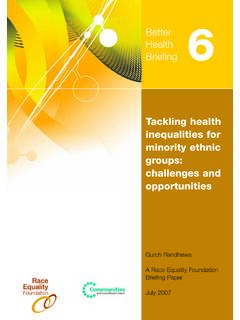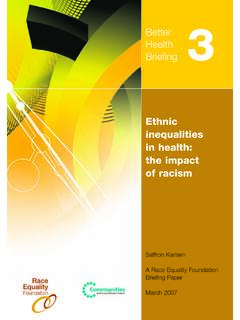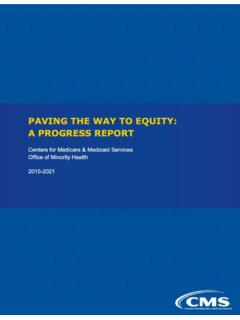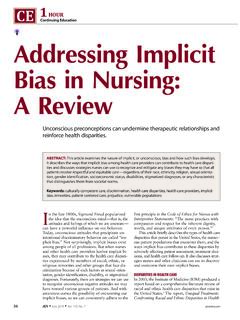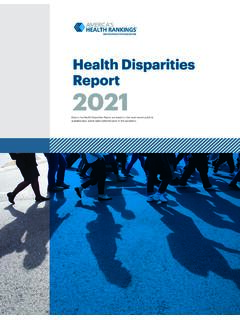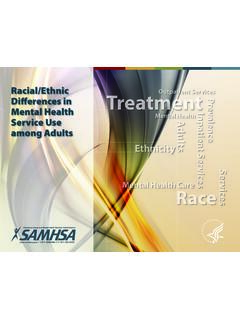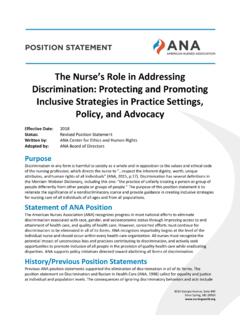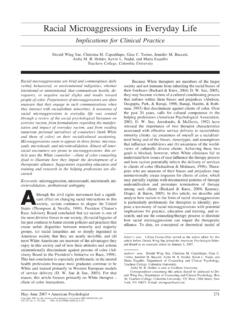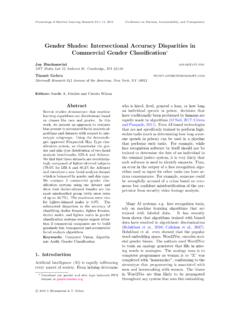Transcription of Racial disparities in mental health: Literature and ...
1 Racial disparities in mental health : Literature and evidence review Tracey Bignall, Samir Jeraj, Emily Helsby and Jabeer Butt 1 Acknowledgments 3 Executive summary 4 Background 4 What we found 4 Resources 6 Conclusions and recommendations
2 8 Racial disparities in mental health Literature and evidence review 10 1 Introduction 11 Policy Scope of the Literature and evidence review 12 Limitations of Literature and evidence 13 2 Review of Literature and evidence 14 What we know from existing evidence 14 Prevalence 14 Black and minority ethnic groups and mental illnesses 15 Suicide and self-harm 18 3 Differences in support and treatment of mental illness 20 Pathways to mental health services 20 Refugees.
3 Asylum seekers and migrants 20 Criminal justice system 21 Treatment of psychosis 23 Treatment of Schizophrenia and Schizoaffective disorders 23 Treatment of Obsessive-compulsive disorder (OCD) 24 Mindfulness 25 Improving Access to Psychological Therapies (IAPT) services 26 Contents4 Understanding Racial disparities in mental health 29 Stigma 29 Access and use of services: men 30 Access and use of services: ethnicity 32 Access and use of services: Perinatal mental health 33 Access and use of services.
4 Spirituality 33 Access and use of services: children and young people 34 Under use of mental health services 35 Cultural matching with health practitioner 35 5 Impact of racism and discrimination 37 On accessing mental health services 37 On detention 37 Conscious or unconscious bias
5 38 Impact of discrimination on mental health 39 6. Intersectionality and mental health 40 Stigma, spirituality and mental health 40 gender , race and migration 41 Sexual orientation, race and mental health 41 7 What works in supporting Black and minority ethnic people with mental illness? 44 Resilience and recovery/learning from mental health survivors 44 The role of the voluntary, community and social enterprise sector 45 8 Suggested action from Literature review and evidence 46 9 Concluding remarks 48 Bibliography 492 ContentsWe would like to acknowledge the support from the following people whose input contributed to the Racial disparities in mental health project: Members of the Project Steering Group.
6 Chris Stein, Men s health Forum Annah Psarros, Maternity Action Jordan Lartey, Nacro Dania Hanif, Association of mental health Provers Sam Worrell, Friends, Families and Travellers Sarah Sweeney, Friends, Families and Travellers Terry Green, Person with lived experience Jennifer Jean-Paul, LGBT Partnership Tutiette Thomas, Person with lived experience Emmanuel Dauwadu, Person with lived experience Jabeer Butt, Race Equality Foundation Tracey Bignall, Race Equality Foundation Samir Jeraj, Race Equality Foundation Emily Helsby, Race Equality Foundation Dr Nasreen Ali, Senior Research Fellow in Public health , Institute for health Research, University of Bedfordshire Frank Keating, Professor of Social Work and mental health , Director of Learning and Teaching Centre for Social Work and School of Law, Royal Holloway University of London Participants of the two seminars held 28th November 2018 and 25th March 2019 Colleagues who submitted case studies and good practice information 3 AcknowledgmentsCopyright 2019 Race Equality FoundationBackground This research review has been created as part of the Racial disparities in mental health project commissioned by NHS England.
7 This project has sought to improve knowledge and understanding so that good practice and effective strategies may be implemented. This, in turn, will enable better outcomes for black and minority ethnic (BME) communities who have a mental illness and black and minority ethnic people experiencing mental health treatment. This project was multifaceted, with an intersectional approach deployed. The project started by identifying a scoping Literature review; two all-day seminars and finally, the identification of good practice on improving the experiences and outcomes of black and minority ethnic communities and the development of an infographic to visually illustrate this information1. Black and minority ethnic people experience a wide number of inequalities related to mental health . This ranges from particular ethnic communities having a higher risk of being detained in secure institutions to more general difficulties for all black and minority ethnic communities in accessing appropriate care and support their for mental health needs.
8 The evidence suggests that black and minority ethnic communities are at comparatively higher risk of mental ill health , and disproportionately impacted by social detriments associated with mental ill health . From accessing treatment to receiving mental health support, through to assessment and treatment, inequality and discrimination remains rife for black and minority ethnic communities. What we found The Literature review highlighted evidence related to the prevalence of mental illness amongst black and minority ethnic communities (and specific ethnic groups). The Literature found differences in experiences and outcomes of black and minority ethnic people with the white English community; possible explanations for these differences; existing gaps in current evidence and research and identification of good practice in addressing mental health and Racial disparities .
9 4 Executive summary1 We have also had ongoing contact with other mental health projects of the health and Wellbeing Alliance including the perinatal mental health project throughout this project and liaised over progress. Prevalence The evidence on prevalence suggests that black and minority ethnic communities are at comparatively higher risk of mental ill health , and disproportionately impacted by social detriments associated with mental illness. For example, people from African Caribbean communities are three times more likely to be diagnosed and admitted to hospital for schizophrenia than any other group. Irish Travellers are six times more likely to die as a result of suicide than non-Travellers. However, consistency in sampling methodology in research studies raises questions about the generalisability and comparisons of prevalence data across ethnic groups.
10 Access The evidence shows black and minority ethnic communities are less likely to access mental health support in primary care ( through their GP) and more likely to end up crisis care . Black and minority ethnic people are 40 percent more likely to access mental health services via the criminal justice system than white2 people. There is a wide range of different barriers for black and minority ethnic communities accessing mental health care . Some of these include a lack of knowledge around mental health care , different cultural attitudes or ideas about mental health , and relationships with healthcare practitioners in the local area. For people without immigration status, who have a gender non-conforming or trans identity, and/or also have a disability, institutional attitudes towards minorities, really serve as a barrier for communities accessing mental health access and treatment.
